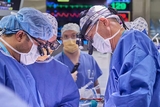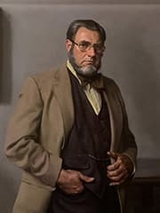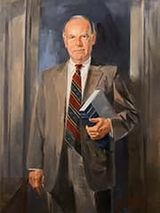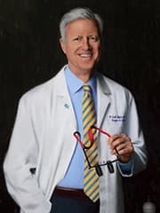
The Department of Surgery at Children's Hospital of Philadelphia has had a rich and sustained tradition of excellence over the years. The Department has been led by surgical pioneers who have played a seminal role in shaping the practice of pediatric and fetal surgery worldwide.
C. Everett Koop, MD (1948-1981)

C. Everett Koop, MD
, was one of the very first surgeons to dedicate his career to the care of children. He became CHOP’s first full-time pediatric surgeon in 1946 and served as the Hospital’s Surgeon-in-Chief for 33 years.Dr. Koop’s singular goal over his three decades at CHOP was to foster the development of a pediatric surgical specialization at CHOP and elsewhere, so that any sick child could have access to the same types of surgical specialists as adults do, whether it be pediatric general surgery, urology, plastic surgery, orthopaedics, cardiac surgery, ENT, or ophthalmology. He achieved this goal, and his vision is now the model for Departments of Pediatric Surgery everywhere.
Dr. Koop made many other noteworthy accomplishments during his time at CHOP, including:
- devised many lifesaving techniques to repair birth defects in babies
- established the world’s first Neonatal Intensive Care Unit
- made spectacular advances in the separation of conjoined twins – CHOP now has one of the largest experiences with conjoined twins in the world
- pioneered the multidisciplinary treatment of solid childhood tumors such as neuroblastoma
- helped found the Surgical Section of the American Academy of Pediatrics, which served as a forum for pediatric surgeons to share knowledge
- trained a generation of pediatric surgical leaders — many who went on to become chiefs of surgery at institutions across the world
- served as the first editor-in-chief of the Journal of Pediatric Surgery (1964-1976), the seminal journal of the specialty worldwide
After his time at CHOP, Dr. Koop went on to become the Surgeon General of the U.S. — a second career for which he is famous.
James A. O’Neill, MD (1981-1995)

During his 14-year tenure as CHOP’s Surgeon-in-Chief, James A. O’Neill, MD, continued to shape the Department. He developed programs in heart, kidney and liver transplantation, as well as extracorporeal membrane oxygenation (ECMO). The Level I Pediatric Trauma Program was created in 1986, a bellwether for other major Children’s Hospitals. He also fostered further surgical specialization. The recruitment of Cardiac Surgical Chief William Norwood led to worldwide referrals for the surgical treatment of hypoplastic left heart syndrome and other congenital heart anomalies.
N. Scott Adzick, MD, MMM (1995-Present)

Since 1995, the Department has been led by Surgeon-in-Chief N. Scott Adzick, MD, MMM. He is the C. Everett Koop Professor of Pediatric Surgery at CHOP and Professor of Surgery, Pediatrics, and Obstetrics and Gynecology at the Perelman School of Medicine at the University of Pennsylvania.
Dr. Adzick is an internationally recognized pioneer in fetal surgery who has dedicated his career to the pursuit of groundbreaking prenatal treatments for life-threatening and debilitating birth defects. He is the Founder and Director of CHOP’s Richard D. Wood Jr. Center for Fetal Diagnosis and Treatment. He led a breakthrough study that demonstrated that performing fetal surgery for spina bifida results in significantly improved outcomes compared to conventional postnatal repair.
During Dr. Adzick’s tenure, the Department of Surgery at CHOP has undergone astounding growth, from 34 pediatric surgical specialists in 1995 to more than 130 pediatric surgical specialists who can meet any surgical need of a child.
In addition to many “firsts” in fetal surgery under Dr. Adzick’s leadership, the Department has been at the forefront of surgical innovations that include:
- the first bilateral hand transplant ever performed in a child
- gene therapy to cure a rare type of childhood blindness (Leber congenital amaurosis)
- development of surgical techniques for the separation of conjoined twins, including a recent novel technique for separation of craniopagus twins
- creation of the Center for Data Driven Discovery in Biomedicine (D3b)
- establishment of the Craniofacial Center for Innovation
- development of the Artificial Womb
- creation of 44 endowed chairs and many other sources of philanthropy
- substantial NIH funding in each of the Department’s eight surgical divisions
- development of programs in minimally invasive and robotic surgery
- development of CHOP Frontier Programs for congenital diaphragmatic hernia, thoracic insufficiency, airway disorders, thyroid disease, hyperinsulinism, concussion, cardiac valve disease, heart failure, and fetal and neonatal resuscitation
Dr. Adzick led the creation of the Garbose Family Special Delivery Unit in 2008, the world’s first birth facility in a pediatric hospital specifically designed for healthy mothers carrying babies with known birth defects. He is an active pediatric general and thoracic surgeon, performing more than 400 operations a year. In addition to fetal surgery, he performs surgery in newborns including repairs for congenital diaphragmatic hernia, abdominal wall defects, lung lesions and other complex neonatal conditions. As part of the Congenital Hyperinsulinism Center team, he has performed more than 600 pancreatectomies — the most of any surgeon in the world. More than 300 babies have been cured of focal hyperinsulinism through this surgery. He is also a leader of the Pediatric Thyroid Center team which demonstrated that high thyroid surgery volumes at CHOP are associated with extremely low complication rates.
Dr. Adzick has had National Institutes of Health (NIH) grant support for more than 30 years. He has authored more than 600 peer-reviewed publications and has an h-index of 113. He was elected to the National Academy of Medicine in 1998.
In 2013, he was awarded the John Scott Medal, which is presented to men and women whose inventions and innovations improved the “comfort, welfare, and happiness of human kind” in a significant way. Previous recipients of the award include Thomas Edison, Madame Curie, the Wright Brothers, Nicola Tesla, Edwin Land, Jonas Salk, Frederick Banting, Guglielmo Marconi, Alexander Fleming, and several Nobel Laureates. In 2015, Dr. Adzick received the Samuel D. Gross Prize, one of the oldest prizes for surgery and surgical research in the world. The prize was first awarded in 1895 and is awarded once every five years to the American surgeon who has made the greatest contributions to surgery.
Featured in this article
Specialties & Programs
The Department of Surgery at Children's Hospital of Philadelphia has had a rich and sustained tradition of excellence over the years. The Department has been led by surgical pioneers who have played a seminal role in shaping the practice of pediatric and fetal surgery worldwide.
C. Everett Koop, MD (1948-1981)

C. Everett Koop, MD
, was one of the very first surgeons to dedicate his career to the care of children. He became CHOP’s first full-time pediatric surgeon in 1946 and served as the Hospital’s Surgeon-in-Chief for 33 years.Dr. Koop’s singular goal over his three decades at CHOP was to foster the development of a pediatric surgical specialization at CHOP and elsewhere, so that any sick child could have access to the same types of surgical specialists as adults do, whether it be pediatric general surgery, urology, plastic surgery, orthopaedics, cardiac surgery, ENT, or ophthalmology. He achieved this goal, and his vision is now the model for Departments of Pediatric Surgery everywhere.
Dr. Koop made many other noteworthy accomplishments during his time at CHOP, including:
- devised many lifesaving techniques to repair birth defects in babies
- established the world’s first Neonatal Intensive Care Unit
- made spectacular advances in the separation of conjoined twins – CHOP now has one of the largest experiences with conjoined twins in the world
- pioneered the multidisciplinary treatment of solid childhood tumors such as neuroblastoma
- helped found the Surgical Section of the American Academy of Pediatrics, which served as a forum for pediatric surgeons to share knowledge
- trained a generation of pediatric surgical leaders — many who went on to become chiefs of surgery at institutions across the world
- served as the first editor-in-chief of the Journal of Pediatric Surgery (1964-1976), the seminal journal of the specialty worldwide
After his time at CHOP, Dr. Koop went on to become the Surgeon General of the U.S. — a second career for which he is famous.
James A. O’Neill, MD (1981-1995)

During his 14-year tenure as CHOP’s Surgeon-in-Chief, James A. O’Neill, MD, continued to shape the Department. He developed programs in heart, kidney and liver transplantation, as well as extracorporeal membrane oxygenation (ECMO). The Level I Pediatric Trauma Program was created in 1986, a bellwether for other major Children’s Hospitals. He also fostered further surgical specialization. The recruitment of Cardiac Surgical Chief William Norwood led to worldwide referrals for the surgical treatment of hypoplastic left heart syndrome and other congenital heart anomalies.
N. Scott Adzick, MD, MMM (1995-Present)

Since 1995, the Department has been led by Surgeon-in-Chief N. Scott Adzick, MD, MMM. He is the C. Everett Koop Professor of Pediatric Surgery at CHOP and Professor of Surgery, Pediatrics, and Obstetrics and Gynecology at the Perelman School of Medicine at the University of Pennsylvania.
Dr. Adzick is an internationally recognized pioneer in fetal surgery who has dedicated his career to the pursuit of groundbreaking prenatal treatments for life-threatening and debilitating birth defects. He is the Founder and Director of CHOP’s Richard D. Wood Jr. Center for Fetal Diagnosis and Treatment. He led a breakthrough study that demonstrated that performing fetal surgery for spina bifida results in significantly improved outcomes compared to conventional postnatal repair.
During Dr. Adzick’s tenure, the Department of Surgery at CHOP has undergone astounding growth, from 34 pediatric surgical specialists in 1995 to more than 130 pediatric surgical specialists who can meet any surgical need of a child.
In addition to many “firsts” in fetal surgery under Dr. Adzick’s leadership, the Department has been at the forefront of surgical innovations that include:
- the first bilateral hand transplant ever performed in a child
- gene therapy to cure a rare type of childhood blindness (Leber congenital amaurosis)
- development of surgical techniques for the separation of conjoined twins, including a recent novel technique for separation of craniopagus twins
- creation of the Center for Data Driven Discovery in Biomedicine (D3b)
- establishment of the Craniofacial Center for Innovation
- development of the Artificial Womb
- creation of 44 endowed chairs and many other sources of philanthropy
- substantial NIH funding in each of the Department’s eight surgical divisions
- development of programs in minimally invasive and robotic surgery
- development of CHOP Frontier Programs for congenital diaphragmatic hernia, thoracic insufficiency, airway disorders, thyroid disease, hyperinsulinism, concussion, cardiac valve disease, heart failure, and fetal and neonatal resuscitation
Dr. Adzick led the creation of the Garbose Family Special Delivery Unit in 2008, the world’s first birth facility in a pediatric hospital specifically designed for healthy mothers carrying babies with known birth defects. He is an active pediatric general and thoracic surgeon, performing more than 400 operations a year. In addition to fetal surgery, he performs surgery in newborns including repairs for congenital diaphragmatic hernia, abdominal wall defects, lung lesions and other complex neonatal conditions. As part of the Congenital Hyperinsulinism Center team, he has performed more than 600 pancreatectomies — the most of any surgeon in the world. More than 300 babies have been cured of focal hyperinsulinism through this surgery. He is also a leader of the Pediatric Thyroid Center team which demonstrated that high thyroid surgery volumes at CHOP are associated with extremely low complication rates.
Dr. Adzick has had National Institutes of Health (NIH) grant support for more than 30 years. He has authored more than 600 peer-reviewed publications and has an h-index of 113. He was elected to the National Academy of Medicine in 1998.
In 2013, he was awarded the John Scott Medal, which is presented to men and women whose inventions and innovations improved the “comfort, welfare, and happiness of human kind” in a significant way. Previous recipients of the award include Thomas Edison, Madame Curie, the Wright Brothers, Nicola Tesla, Edwin Land, Jonas Salk, Frederick Banting, Guglielmo Marconi, Alexander Fleming, and several Nobel Laureates. In 2015, Dr. Adzick received the Samuel D. Gross Prize, one of the oldest prizes for surgery and surgical research in the world. The prize was first awarded in 1895 and is awarded once every five years to the American surgeon who has made the greatest contributions to surgery.
Contact us
Division of Pediatric General, Thoracic and Fetal Surgery